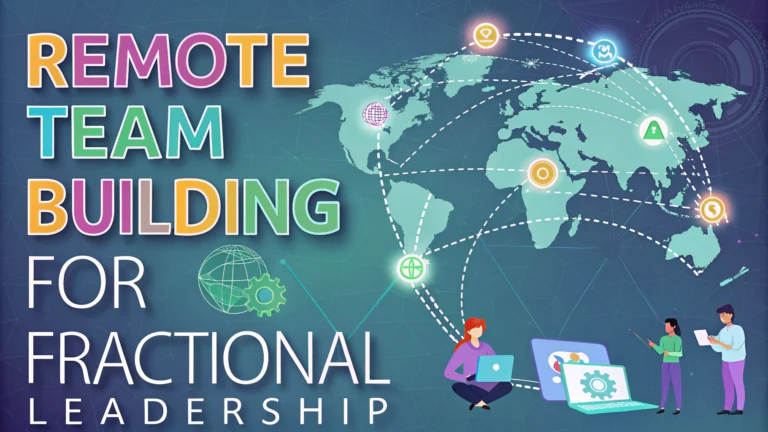Building and managing remote teams presents unique challenges for fractional leaders who may only work with their teams part-time or across multiple organizations.
Successful remote team building requires careful attention to communication, culture, and connection – especially when leadership roles are shared or part-time.
This quick guide explores practical strategies for fractional COOs and leaders to create engaged, collaborative remote teams while maintaining flexibility and effectiveness.
Essential Remote Team Building Activities
- Virtual coffee breaks (15-30 min informal chats)
- Online team games and trivia
- Remote lunch-and-learn sessions
- Digital escape rooms
- Virtual book clubs
- Online fitness challenges
Communication Tools for Remote Teams
Select primary communication tools that integrate well across organizations:
- Slack – For instant messaging and quick updates
- Zoom – Video meetings and team gatherings
- Asana/Trello – Project management and task tracking
- Miro – Virtual whiteboarding and collaboration
- Loom – Asynchronous video updates
Establishing Clear Communication Protocols
- Set specific “office hours” when you’re available
- Create communication guidelines for urgent vs. non-urgent matters
- Document meeting schedules and attendance expectations
- Establish response time standards for different channels
Building Trust in Part-Time Leadership
Schedule regular one-on-one check-ins with team members, even if brief.
Document and share decision-making processes to maintain transparency.
Create clear handoff procedures when transitioning between fractional leaders.
Measuring Remote Team Engagement
| Metric | Measurement Method |
|---|---|
| Team Participation | Meeting attendance and contribution rates |
| Communication Quality | Response times and message clarity |
| Project Completion | Task completion rates and deadlines met |
| Employee Satisfaction | Regular anonymous surveys |
Quick Implementation Tips
- Start with one team-building activity per month
- Use free trials of tools before committing
- Create a digital team handbook
- Schedule activities during overlapping time zones
- Record sessions for those who cannot attend live
Moving Forward with Remote Team Success
Regular assessment and adjustment of remote team building strategies ensures continued effectiveness.
Document successful approaches to share with other fractional leaders in your network.
Consider joining professional networks like COO Alliance or Vistage to connect with other fractional leaders.
Maintaining Work-Life Balance in Remote Teams
- Set boundaries for after-hours communication
- Encourage regular breaks and time off
- Respect different time zones and schedules
- Promote “disconnect time” for focused work
Creating Virtual Team Traditions
Develop recurring activities that build team identity and culture:
- Monthly virtual celebrations for milestones
- Quarterly remote team awards
- Annual virtual retreats
- Regular skill-sharing sessions
Managing Cross-Cultural Remote Teams
Cultural Considerations
- Acknowledge and celebrate cultural differences
- Adapt communication styles for diverse teams
- Consider cultural holidays and observances
- Provide language support when needed
Technology Integration Best Practices
- Ensure all tools are accessible across regions
- Provide training for new technology adoption
- Create backup plans for technical issues
- Regular updates of digital resources
Empowering Remote Team Success
Remote team building in fractional leadership roles requires intentional effort and consistent adaptation. Focus on creating sustainable practices that can continue in your absence.
Invest in tools and processes that facilitate seamless collaboration, while maintaining the human connection that drives team success.
Remember that building strong remote teams is an ongoing journey – celebrate progress and remain flexible as team needs evolve.
FAQs
- What is fractional leadership in remote team building?
Fractional leadership is when experienced executives work part-time or on a contract basis with multiple organizations, providing high-level expertise without the cost of full-time employment. - How can a fractional COO effectively build remote teams?
A fractional COO can build remote teams by implementing clear communication protocols, establishing virtual collaboration tools, creating standardized processes, and fostering a strong digital culture. - What are the key technologies needed for remote team building under fractional leadership?
Essential technologies include project management software, video conferencing platforms, team collaboration tools, cloud-based document sharing, and communication platforms like Slack or Microsoft Teams. - How do you measure remote team performance under fractional leadership?
Performance is measured through KPIs, output metrics, project completion rates, team engagement levels, and regular virtual performance reviews. - What are the best practices for virtual onboarding in a fractional leadership model?
Best practices include structured digital orientation programs, virtual mentorship assignments, clear documentation of processes, scheduled check-ins, and interactive training sessions. - How can fractional COOs maintain team cohesion in a remote environment?
Team cohesion can be maintained through regular virtual team building activities, scheduled informal video meetings, collaborative projects, recognition programs, and consistent communication channels. - What are the common challenges in remote team building for fractional leaders?
Common challenges include time zone management, cultural differences, communication barriers, technology adoption, maintaining work-life boundaries, and building trust virtually. - How do you establish accountability in remote teams under fractional leadership?
Accountability is established through clear goal setting, regular progress tracking, transparent reporting systems, defined roles and responsibilities, and consistent feedback loops. - What role does company culture play in remote team building for fractional COOs?
Company culture is crucial for remote team success, requiring intentional efforts to establish shared values, promote inclusion, celebrate achievements, and maintain organizational identity across virtual spaces. - How can fractional leaders ensure effective knowledge transfer in remote teams?
Knowledge transfer can be achieved through documented processes, recorded training sessions, shared knowledge bases, regular team learning sessions, and mentorship programs.







